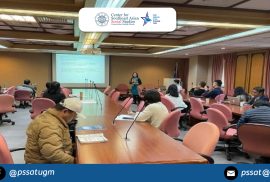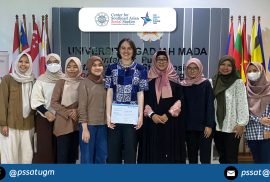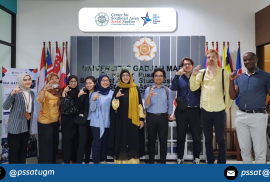Dr. phil. Vissia Ita Yulianto, researcher of CESASS presented her joint project on the Internationalization of Higher Education in Indonesia, Taiwan and Japan in the 1st NCCU Conference on Southeast Asian Socio-Cultural Studies, 16-17 December 2023. This research is in collaboration with Prof. Ming Sheng Wang (National Chengchi University/NCCU, Taiwan) and Prof. Naoki Umemiya (Sophia University, Japan). Research collaborators include Dr. Wahyu Supartono (MMPT), Dr. Falikul Isbah (Fisipol) and Prof. Rini Rachmawati (CESASS). The project is supported by NCCU for 2 years (2023-2024).

Thursday, December 21, farewell session and certificate handover was held for Michaelie Trenbath, an international internship student from Australia National University, Australia. She joined the internship program at CESASS UGM for the October-December 2023 period, which also collaborates with the Australian Consortium For In Country Indonesian Studies (ACICIS).
It’s related to SDGs 4 (Quality Education) and 17 (Parnerships for the Goals).
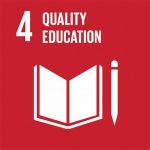
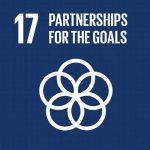
Center for Southeast Asian Social Studies (CESASS) UGM invited as a speaker at Curratorial Class, AMEX 2023, Sonobudoyo Museum on December 14, 2023 that representative by Dr. Arif Akhyat, M.A (Senior lecturer of history, UGM and researcher at CESASS UGM) talks about Piracy in Southeast Asia.
The class was specifically talking about the piracy and integration in the area. Dr. Akhyat highlighted the discussion about strategic position in Nusantara, new patterns of cosmopolist, and piracy and economy network.

Center for Southeast Asian Social Studies (CESASS) UGM in collaboration with the Faculty of Geography UGM organized the German-Southeast Asian ForUm of Urban Experts’ Conference on “National Urban Development Strategies for ASEAN Member Countries” on November 26 to December 5, 2023.
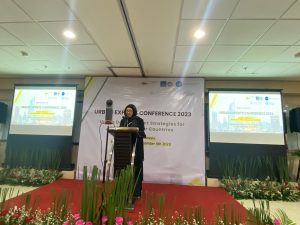
The event began with the Overview and Objectives of ForUm delivered by Prof. Frauke Krass, followed by the presentation of the CESASS Profile and Program by Prof. Dr. Rini Rachmawati, S.Si., M.T. as Director of CESASS UGM, and the presentation of the Dean of the Faculty of Geography UGM, Dr. Danang Sri Hadmoko.
On November 17, 2023, the Dissemination of Community Satisfaction Survey (SKM) Results of Yogyakarta City in 2023 was held, a collaboration between CESASS UGM and Public Works, Housing, and Settlement Areas Agency (DPUPKP of Yogyakarta City in 2023. This event is a follow-up to the survey activities that have been carried out.
Located at the Indonesia Room, CESASS 2nd Floor, the event was opened by Prof. Dr. Rini Rachmawati, S.Si., M.T. as the Head of PSSAT UGM and the team leader of SKM of Yogyakarta City in 2023. The speakers are Ir. Hari Setyowacono, M.T. (Head of DPUPKP of Yogyakarta City), Erna Susanti, S.E. (Secretary of DPUPKP of Yogyakarta City), Nini Yuniarti, S.E. (Junior Expert Planner DPUPKP of Yogyakarta City).
Dr. phil. Vissia Ita Yulianto (Head of Program and Publication of CESASS UGM) taught an academic writing workshop as part of the internship activities from October to December 2023.
The first lesson was held in the second week of November and focused on how to write academic articles using scientific principles such as reliable publications and valid sources.
The second class, held in the third week of November, covered qualitative research methods, with an emphasis on methodology and data collection.
The ASEAN Master Program of Master Management, Universitas Gadjah Mada are going to settle a visit to CESASS UGM on Tuesday, November 14th 2023, led by Prof. Dr. Rini Rachmawati, S.Si., M.T. (Director of CESASS, UGM). Norway, Hungary, the Philippines, Brunei Darussalam, Malaysia, Myanmar, Spain, and Indonesia were among the students who attended. The intention of the visit was to introduce one of UGM’s research centers and obtain information about the course work at the Center for Southeast Asian Social Studies.
[Yogyakarta, November 2nd, 2023] – The Center for Southeast Asian Social Studies (CESASS) successfully hosted the third installment of its Talk Series on November 2nd, 2023. The event, held via Zoom, commenced at 10.30 a.m., bringing together renowned experts and participants from various disciplines and backgrounds to deliberate on the complex nexus of human trafficking, border studies, and the globalization of Southeast Asia.
Carrying the theme of “Bridging the Divide” the event sought to cultivate a comprehensive grasp of the intricate challenges and prospects pervading the Southeast Asian region. The movement of people across borders is predominantly motivated by economic considerations. However, this has amplified the gravity of human trafficking and smuggling, posing formidable challenges in the pursuit of effective countermeasures. Therefore, the discussions emphasized the imperative for collaborative endeavors and holistic strategies to effectively confront the pressing issues affecting the socio-political and economic fabric of the region.
Center for Southeast Asian Social Studies (CESASS), Universitas Gadjah Mada presents CESASS Talk Series #3 “Bridging the Divide: Exploring the Nexus of Human Trafficking, Border Studies, and the Globalization of Southeast Asia”
🗓️Date: Thursday, November 2nd 2023
⏰Time: 10.30 AM – 12.30 PM (Jakarta Time)
Join us online with the link below.
Zoom Meeting ID: 937 9568 9825
Passcode: CTS3
Link: ugm.id/ZoomCTS3
🎤Speaker:
1. Associate Prof. Dr. Mohd Na’eim Bin Ajis (Institute for Indonesia, Thailand and Singapore, Universiti Utara Malaysia)
2. Prof. Dr. Purwo Santoso, M.A. (Department of Politics and Governance, Faculty of Social and Political Sciences, Universitas Gadjah Mada)
The 2nd National Urban Forum & Indonesia Urban Youth Assembly is the culmination of activities organized by the Ministry of Public Works & Housing as a commemoration of World Habitat Day and World Cities Day. This activity was held on Thursday, October 19, 2023 at the Indonesia Area, Gelora Bung Karno (GBK), Jakarta.
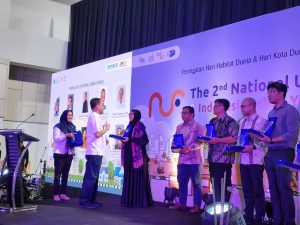
In this activity, Prof. Dr. Rini Rachmawati, S.Si., M.T. as the Working Group Formulation Team (WG 5) Urban Housing & Basic Services Sub Theme Smart Cities became one of the recipients of the national urban forum formulator award. On this occasion, she also became a resource person for WG 5 Smart Cities to convey the results of the formulation and capture input.

